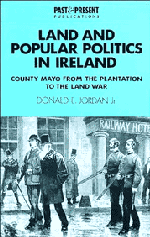Book contents
- Frontmatter
- Contents
- List of figures
- List of maps
- List of tables
- Acknowledgments
- List of abbreviations
- Introduction
- PART 1 COUNTY MAYO PRIOR TO THE FAMINE
- PART 2 THE POST-FAMINE TRANSFORMATION OF COUNTY MAYO
- 4 Economy and society, 1846-1877
- 5 Post-Famine politics prior to the Land War
- PART 3 THE LAND WAR IN COUNTY MAYO
- 1 Mayo evictions: explanation of calculations and sources for Table 4.1 and Figure 4.1
- 2 Occupations of suspected Fenians, County Mayo, as recorded in police files, 1866-71
- 3 List of persons whose arrest is recommended under the Protection of Persons and Property Act, 1881, County Mayo
- 4 Explanation of categories and list of Land League meetings for Map 5.2 and Table 3.1
- Bibliography
- Index
- Past and Present Publications
5 - Post-Famine politics prior to the Land War
Published online by Cambridge University Press: 03 May 2011
- Frontmatter
- Contents
- List of figures
- List of maps
- List of tables
- Acknowledgments
- List of abbreviations
- Introduction
- PART 1 COUNTY MAYO PRIOR TO THE FAMINE
- PART 2 THE POST-FAMINE TRANSFORMATION OF COUNTY MAYO
- 4 Economy and society, 1846-1877
- 5 Post-Famine politics prior to the Land War
- PART 3 THE LAND WAR IN COUNTY MAYO
- 1 Mayo evictions: explanation of calculations and sources for Table 4.1 and Figure 4.1
- 2 Occupations of suspected Fenians, County Mayo, as recorded in police files, 1866-71
- 3 List of persons whose arrest is recommended under the Protection of Persons and Property Act, 1881, County Mayo
- 4 Explanation of categories and list of Land League meetings for Map 5.2 and Table 3.1
- Bibliography
- Index
- Past and Present Publications
Summary
Mayo is in a very bad – in a most unsatisfactory state. No man can confidently state that either property or life is safe within the precincts. Terrorism has created throughout the county a wide-spread and very general sense of insecurity. Much of this feeling of insecurity is attributable to exaggerated reports and false rumours, but terrorism is the order of the day amongst us, and it is impossible to divest one's mind of the apprehension that attempts may be made, and successfully made, to carry out some of those threats with which we have become so familiar.
(N. R. Strich, RM, County Mayo, to Dublin Castle, 21 February 1870)During the 1860s and 1870s the merchants, tradesmen and substantial farmers of provincial Ireland, with their clientage of customers, debtors and sub-tenants, often became centers of patronage and power. Through a combination of wealth, prestige and intimidation they wielded considerable influence in both national and local politics, mounting a successful challenge to the near-monopoly of political power long enjoyed by the landed elite. Few were in a position to stand for parliament, although they exercised increasing influence over those who did, but many members of this new elite found an outlet for their political ambitions in contests for the poor law boards of guardians, whose prestige and power over life in rural Ireland increased enormously between the Famine and the Land War.
- Type
- Chapter
- Information
- Land and Popular Politics in IrelandCounty Mayo from the Plantation to the Land War, pp. 170 - 196Publisher: Cambridge University PressPrint publication year: 1994



